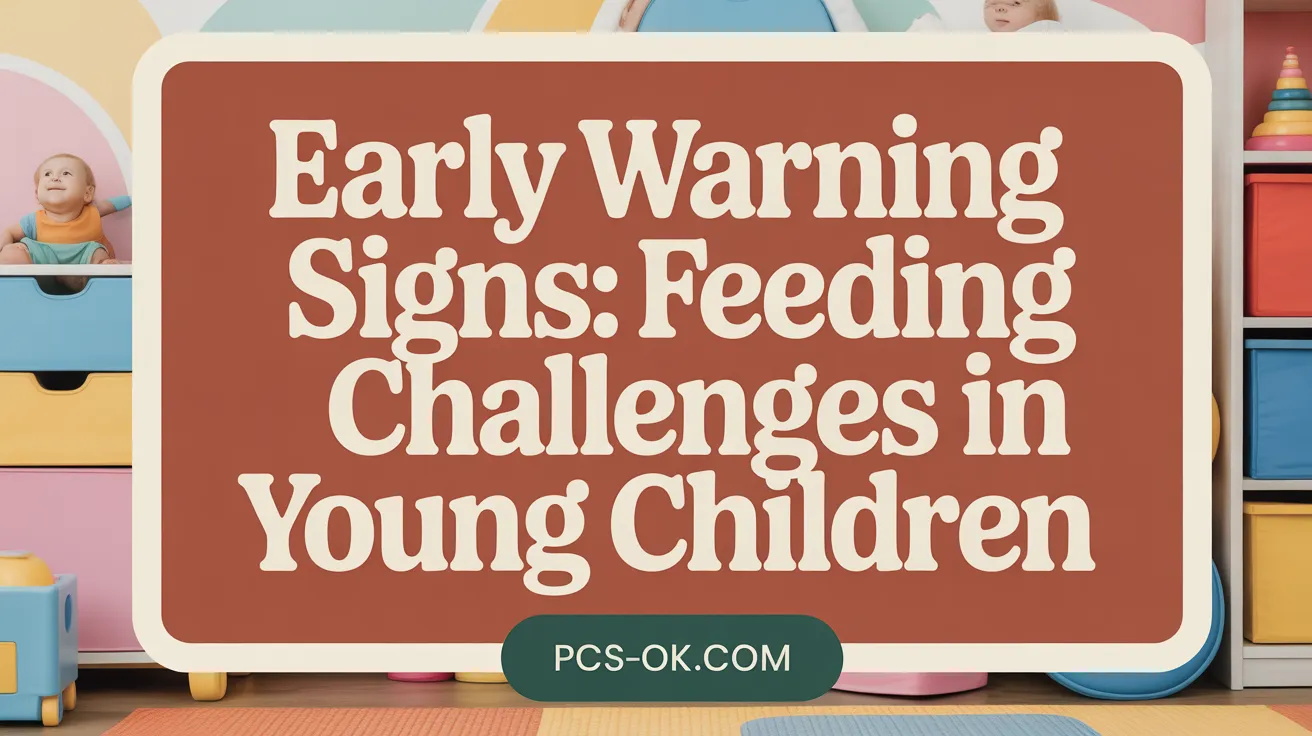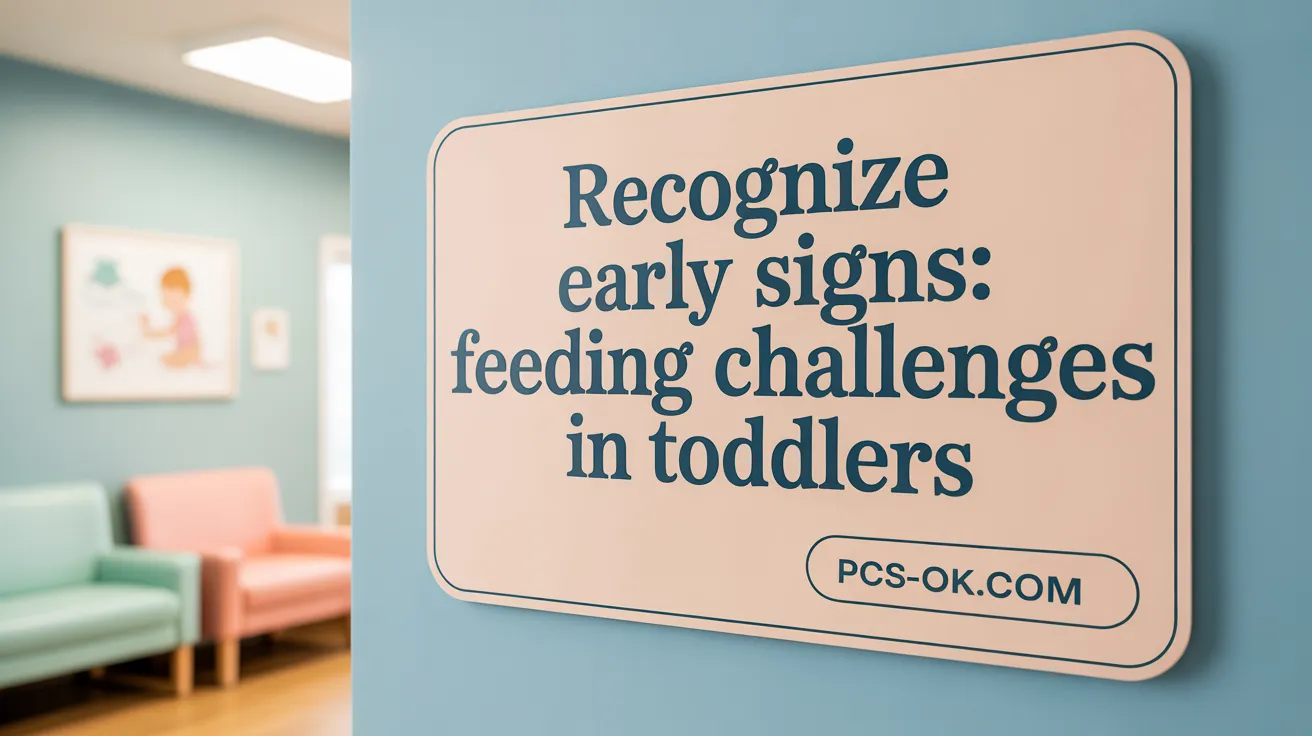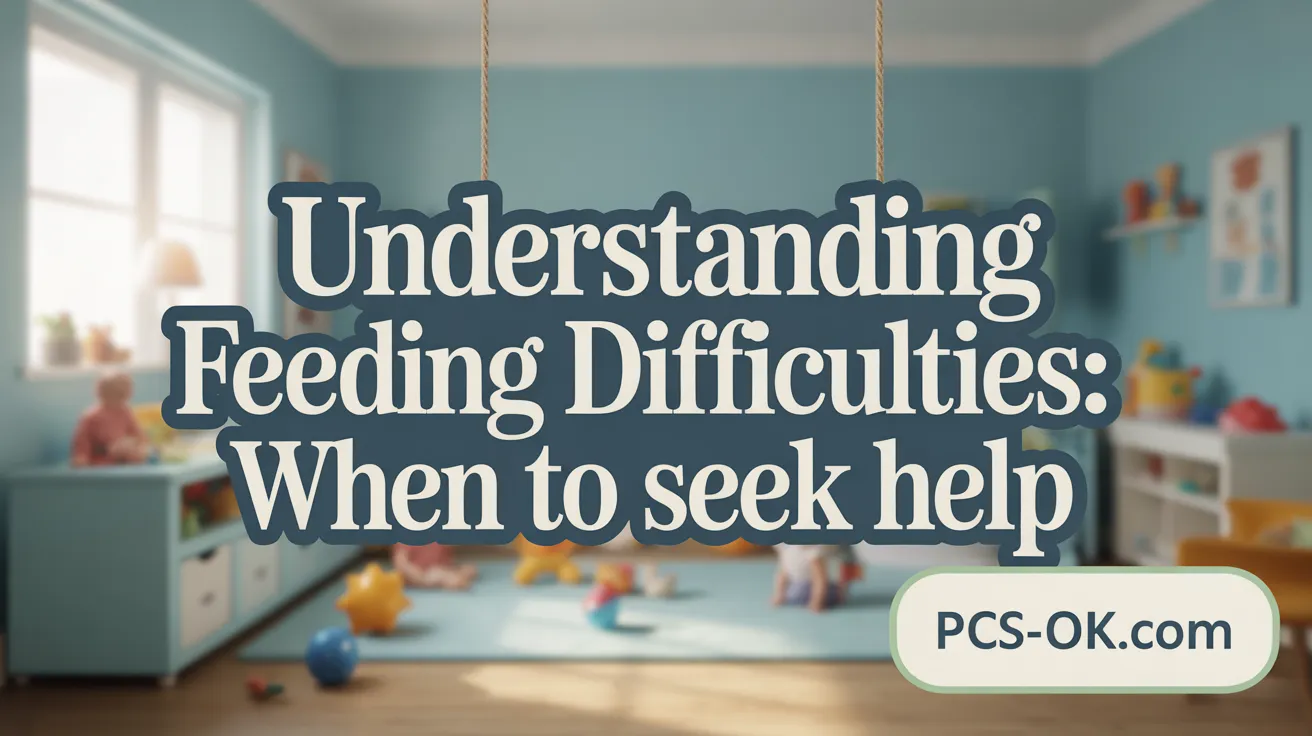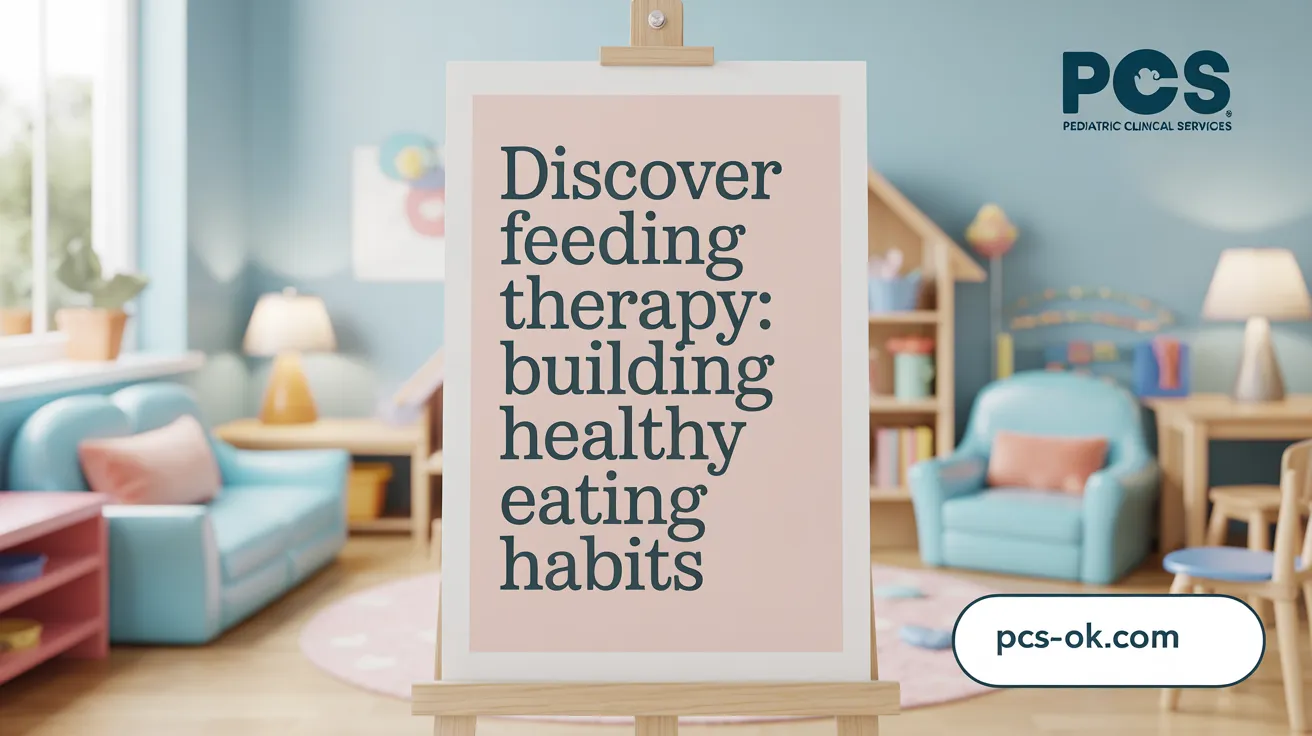Signs Your Toddler Might Need Feeding Therapy
Recognizing Feeding Difficulties Early
Feeding difficulties in toddlers can have far-reaching effects on their health and development. Recognizing the signs early and understanding when to seek professional help is crucial for ensuring your child receives the appropriate support. This article explores common indicators that your toddler might need feeding therapy, outlines key feeding disorders and their symptoms, highlights red flags for parents, and explains the benefits and process of feeding therapy to empower caregivers in supporting their child’s feeding journey.
Common Signs and Symptoms Indicating a Toddler May Need Feeding Therapy

Recognizing when a toddler might need feeding therapy is crucial for ensuring proper nutrition and healthy development. One of the most noticeable signs is a persistent refusal to eat or drink. Some children may eat fewer than 20 foods or avoid entire food groups, which can result in nutritional deficiencies. When a child relies heavily on a G-tube or shows little interest in oral feeding, it often indicates significant feeding challenges.
Oral motor and sensory issues are also indicators. These children might gag, choke, or cough frequently during meals, or have trouble swallowing, which signifies difficulties with muscle coordination or sensory sensitivities. Prolonged mealtimes—lasting longer than 30 minutes—and stressful or negative mealtime behaviors such as tantrums, crying, or shutting down are common signs of underlying feeding problems.
Sensory sensitivities—such as aversions to specific textures, temperatures, or smells—can restrict a child’s diet and hinder their acceptance of a variety of foods. Additionally, children who experience poor weight gain or are not meeting growth milestones may need intervention to address nutritional intake.
Difficulty transitioning between different food textures, such as moving from purees to solid foods, is another red flag. Some children may also struggle with self-feeding skills, like using utensils or drinking independently, which can indicate a need for specialized support.
Lastly, reliance on non-oral feeding methods like feeding tubes, combined with behaviors such as refusing to try new foods or dropping previously accepted foods, are strong indicators that a child could benefit from feeding therapy. Early identification and intervention can significantly improve eating habits and overall growth.
| Sign/Symptom | Description | Potential Concern |
|---|---|---|
| Food Refusal | Consistently refusing to eat or drink | Nutritional risk, developmental delay |
| Limited Diet | Eating fewer than 20 foods or avoiding food groups | Nutritional deficiencies |
| Oral Motor Difficulties | Gagging, choking, coughing, trouble swallowing | Physical feeding issues |
| Extended Mealtimes | Meals lasting over 30 minutes | Feeding difficulties, stress |
| Behavioral Challenges | Tantrums, shut-downs during meals | Emotional or sensory issues |
| Sensory Sensitivities | Aversion to textures, smells, or temperatures | Restricted diet |
| Poor Growth | Falling off growth charts or weight loss | Nutritional deficits |
| Transition Difficulties | Struggling to move from purees to textures | Developmental milestone delay |
| Dependency on G-tube | Relying on non-oral feeding | Severe feeding issues |
Parents and caregivers should monitor these signs and consult professionals if concerns arise. Early assessment and intervention can help children develop balanced eating habits and ensure they receive the necessary nutrients for healthy growth.
Early Feeding Difficulties and Red Flags for Parents to Watch

What early feeding difficulties and red flags should parents watch for in young children?
Parents should keep a close eye on several signs that may indicate their child is struggling with feeding and might need professional guidance. Persistent gagging, choking, or coughing during meals are primary indicators that oral motor or sensory issues could be present. If the child refuses to eat a variety of foods or cannot successfully transition from liquids to solids beyond the typical age of 6-12 months, it suggests potential feeding difficulties.
Discomfort or stress during feeding occasions, along with signs of food spilling from the mouth or sleepiness during meals, are red flags. Slow weight gain or falling off growth percentiles may point to underlying issues affecting nutrition and growth.
Another concern is the risk of silent or overt aspiration, which can cause respiratory problems such as pneumonia or recurrent colds. Children who seem irritable during feeding, engage in prolonged mealtimes, or show reluctance to eat or accept new textures should be evaluated.
Additionally, physical discomfort while eating—such as pain, vomiting, or signs of aspiration—coupled with behavioral cues like tantrums or irritability at mealtime, warrant immediate attention. Early detection of these signs is essential as it allows for timely intervention, preventing further complications and supporting healthy development.
Behavioral, Physical, and Health-Related Signs of Feeding Difficulties in Children

What behavioral, physical, or health-related signs can indicate feeding difficulties in children?
Feeding challenges in children can manifest through various behavioral, physical, and health-related signs. Recognizing these signs early can help determine if a child needs professional assessment and intervention.
Behaviorally, children may show avoidance or selective eating behaviors. This includes refusing to eat certain foods, textures, or entire food groups, often leading to a limited diet that might include fewer than 20 foods. Mealtime stress, such as tantrums, crying, or resistance, is also common. Some children might become anxious or fearful about eating, which can escalate family tensions.
Physically, oral-motor issues often become evident. Common signs include gagging, choking, coughing during meals, and frequent vomiting. Children may drool excessively or have a gurgly or hoarse voice after eating, indicating possible swallowing or vocal cord issues. Difficulty chewing or swallowing, especially when accompanied by coughing or gagging during meals, suggests oral-motor challenges that need addressing.
Health-related signs are equally important. Children struggling with feeding are at risk of poor weight gain and may fall off normal growth charts, leading to nutritional deficiencies. Repeated respiratory illnesses like pneumonia can occur if food or liquids are aspirated into the lungs. Some children might also experience gastrointestinal discomfort or reflux, further complicating feeding.
Family observations are vital, particularly if mealtimes are prolonged, stressful, or involve negative behaviors like crying or tantrums. Children with sensory sensitivities to textures, temperatures, or smells often resist certain foods, which can restrict their diet further.
Overall, a combination of these signs—avoidance and limited dietary variety, physical challenges like gagging and choking, growth concerns, and behavioral issues—indicate the need to consult a healthcare professional specialized in feeding.“}
Common Feeding Disorders in Toddlers and When to Seek Professional Help

What are common feeding disorders in toddlers and their related symptoms?
Toddlers can experience various feeding challenges, with some of the most frequent being sensory-based feeding disorder, oral motor dysfunction, and behavioral feeding issues.
Sensory-based feeding disorder involves sensitivities to textures, smells, or temperatures that result in food refusal or selectivity. Children may gag or choke when presented with certain textures or refuse entire food groups.
Oral motor dysfunction refers to difficulties with muscle coordination necessary for chewing and swallowing. Signs include coughing, choking, or food spilling from the mouth during meals.
Behavioral feeding issues often manifest as tantrums, food refusal, or using mealtime as a battleground. These behaviors can stem from anxiety, past traumatic experiences, or developmental delays.
Common symptoms include prolonged mealtimes, limited acceptance of a variety of foods, and nutritional deficiencies that affect growth. Some children may also avoid using age-appropriate utensils or show distress when transitioning to textured foods.
Early detection of these disorders, with intervention from a multidisciplinary team, is vital to establishing healthy eating behaviors and ensuring proper growth.
When is it necessary to seek professional help or intervention for feeding issues in children?
Seeking professional help is crucial when a child’s feeding difficulties are persistent, or when they significantly impact health and development.
Warning signs include consistent refusal to eat certain foods, especially those necessary for balanced nutrition, and prolonged feeding times exceeding 30 minutes.
If a child shows signs of choking, gagging, or vomiting during meals, or refuses to swallow certain textures, immediate evaluation is advised.
Children with underlying conditions like autism, developmental delays, or oral motor delays require early assessment by healthcare professionals.
Additional indicators warranting help involve poor weight gain, falling off growth curves, or unintentional weight loss.
Behavioral signs, such as extreme tantrums at mealtime or food refusal that causes family conflicts, also signal the need for intervention.
Early consultation with pediatricians, speech-language pathologists, occupational therapists, or feeding specialists ensures proper diagnosis and tailored treatment plans.
In summary, prompt professional support can improve dietary intake, reduce mealtime stress, and support healthy growth trajectories for children facing feeding challenges.
The Feeding Therapy Process and Benefits for Toddlers and Caregivers

How can parents and caregivers be educated about feeding concerns and developmental milestones?
Educating parents and caregivers about feeding concerns and developmental milestones is essential for early identification and intervention. This often involves pediatric visits where healthcare professionals assess growth patterns, eating habits, and developmental progress.
Parents receive detailed informational materials that outline typical milestones, warning signs of feeding difficulties, and tips for supportive feeding practices. Participating in feeding workshops or parent education classes offers hands-on learning opportunities, allowing caregivers to ask questions and practice strategies.
Consulting with feeding specialists—such as speech-language pathologists or occupational therapists—provides tailored advice and personalized guidance.
Understanding age-related feeding milestones, from reflexes at birth to independent self-feeding by age three, equips caregivers to monitor their child’s progress effectively. At-home strategies like offering a variety of foods, avoiding forceful feeding, and recognizing cues for hunger and fullness promote healthy development.
This comprehensive approach ensures caregivers are well-informed and supported in nurturing their child’s feeding skills.
What is the process and what are the benefits of feeding therapy for toddlers?
Feeding therapy is a dedicated intervention led by trained professionals, including occupational and speech therapists, designed to address various feeding and swallowing challenges in young children. The process begins with a thorough assessment, where therapists observe eating behaviors, analyze oral motor skills, and review medical history.
Following this, a customized treatment plan is developed that may include sensory integration activities, oral motor exercises, and behavioral strategies aimed at expanding food acceptance and improving eating skills.
Throughout therapy, emphasis is placed on creating positive and relaxing mealtime experiences, reducing anxiety, and gradually introducing new foods and textures.
The benefits of feeding therapy are wide-ranging. Children often develop stronger oral muscles, increase their acceptance of diverse foods, and improve coordination during eating and swallowing. It also helps reduce food-related behaviors such as tantrums or refusal, leading to more enjoyable mealtimes.
For parents, these improvements translate into less stress, better nutrition for their children, and the development of healthy, sustainable eating habits. Overall, feeding therapy fosters a nurturing environment conducive to a child’s physical growth, emotional well-being, and long-term eating independence.
Supporting Your Child’s Feeding Journey
Identifying feeding difficulties early and understanding when to seek professional help can drastically improve your toddler’s health and mealtime experience. Feeding therapy offers a comprehensive, individualized approach to overcoming feeding challenges by addressing physical, sensory, and behavioral factors. With the combined efforts of therapists and caregivers, toddlers can develop positive feeding skills and enjoy varied, nutritious diets essential for their growth and development. Staying informed, observant, and proactive empowers parents and caregivers to create a supportive environment that fosters healthy eating habits for life.
References
- 10 Signs Your Child Might Need Feeding Therapy (And …
- Food Therapy for Children: When to Try It
- Does My Child Need Feeding Therapy?
- Feeding Therapy
- Signs Your Child Might Need Feeding Therapy
- Does My Child Need Feeding Therapy?
- When Your Baby’s Not Eating Well, Feeding Therapy Can …
- Signs Your Child Might Benefit From Feeding Therapy
- Understanding Feeding Therapy: A Guide for Families
- Pediatric Feeding Disorder
